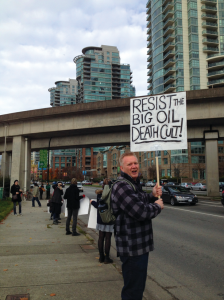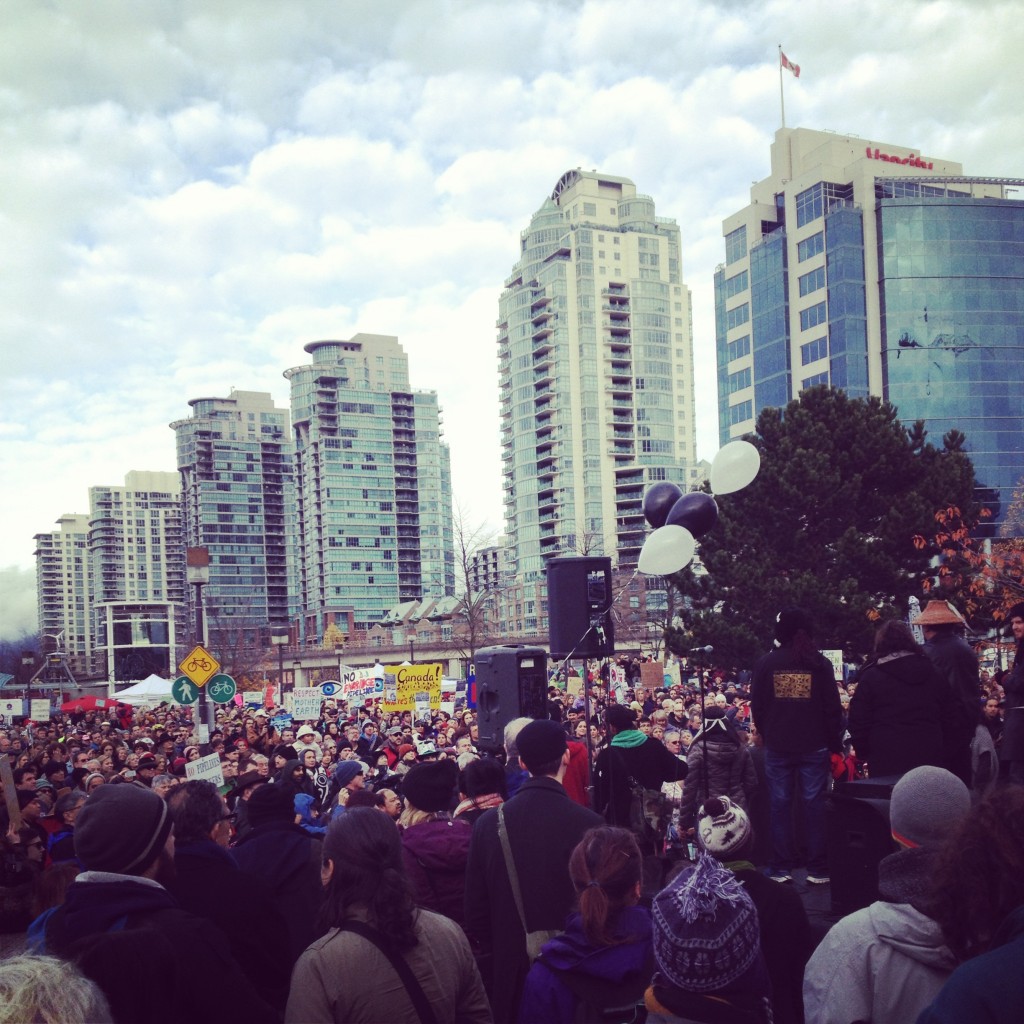By Christopher DeMarcus (The Cascade) – Email
Print Edition: November 20, 2013
“My heart is warm that you are all here. This crowd is colour-blind,” echoed the voices of Matsqui Nation elders across False Creek in Vancouver. Drums pounded out catchy rhythms as the crowd danced and sang in different languages.
Canada was host to over 80 protest rallies this past Saturday. In BC, the main theme was to stop Enbridge from building a new pipeline stretching from the tar sands in Alberta to our northern coastline. Enbridge and the provincial governments plan to have oil tankers from China pick up the unprocessed sludge at the coast, then haul it all over the world for trade.
In Vancouver, thousands of people gathered at Creekside Park near Science World. The rally was more of a community event then a protest. There was a tent full of colouring books for children, food trucks, craft booths, and lots of pamphlets.
Protest rallies have their own kind of culture. Sculptures made of trash were scattered throughout the crowd along with a few people in token Guy Fawkes masks – probably made by a sweatshop in Southern Asia. The protest was not about politics as much as it was about counter-culture expression.
Two young girls in tight clothes poured chocolate syrup over themselves while the crowd looked on with mixed reactions. Some found it vulgar, others sexy.
“We wanted to show how the animals can’t clean themselves up,” said one of the girls, calling herself Hunter, “I couldn’t tell you what I’d like to say about Enbridge, our message is more visual.”
Behind Hunter was a middle-aged mother breast-feeding her child, and next to her was a cigarette-smoking couple wearing expensive bicycle gear. The mother shot a disgusted snarl at the smokers. Meanwhile, the smell of marijuana filled the air. It was an eclectic gathering.
Signs punched up from the crowd: “Love Not Oil,” “Enbridge is the Real Eco Terrorist!’ and the heavily used, “#noenbridge.” Modern protest is apparently not complete without a hashtag.
A high-school student hit the stage with a story about taking the family Prius into the wilderness to see bears. Global BC TV cameras rolled on him. Applause erupted from the crowd for the student’s enthusiasm of a bright future. He melted their hearts. A boy and his Prius.
It was hard to be completely cynical through the obviously positive communal vibe. After all, the rally was humanity in fine form: communing, sharing, and listening.
But at such cultural events a critical eye is forced to wonder. Was this, or was this not, a form of authentic action against the pillaging of our natural resources?
A survey of the crowd made it clear that the protesters had enjoyed the benefits from oil. Aside from the hardcore hippie, most of the audience was dressed in new and expensive Gore-Tex or Lululemon hoodies. Starbucks in one hand, protest sign in the other.
And thus comes a classic argument in environmentalism: How do we detest something we love? The sign says, “Love Not Oil,” but our society makes love with oil. Our gifts, our pleasures, our modern purpose; all of it comes from oil. The kayaks that protested from the water, the cameras that took the pictures, the cars that drove the people, the microphone of the speaker, and the asphalt under our feet: all made from oil.
The developers have called the environmentalists hypocrites because they love the products they claim to hate. The environmentalists embrace the product as long as it comes with a relatable identity or from someone else’s polluting, “Not in my backyard!”
The protesters were taking the right step in the wrong direction. Protesting has slid from a tool for justice into a placebo for individual ego. We need to be more creative with our intentions.
Environmentalists must realize that Earth has become globalized. The planet’s ecosystems have become violently connected. Human migration that used to take 10,000 years is now done in 12 hours. A nuclear disaster in Japan can make it to our coast in the matter of days. What happens here happens there. We are all connected.
The hegemonic nature of our economic structure is what we are battling. Environmentalists simply cannot attack one corporation or project out of millions and expect results. We have to critique and rebuild the structures of global economic capital. We have to rethink what money means.
Doesn’t make for fun sign-waving anymore, does it?
This is how the economic system works: it needs the masses to believe that rallies and protests can shape environmentalist outcomes. The oil company likes the kid who talks about his Prius. If I was the CEO of Exxon, I’d cut him a cheque.
It’s a heartbreaking truth to know that for all our efforts, all our protests, and all the vegetarian hot dogs sold in food trucks, we have failed.
But we must accept this truth if we wish to conserve our natural world. Unlike most cultural critics, who wish to tear down the environmentalist movement, my desire is to remodel it.
Environmentalists need to separate the things they like from the things that they want. We need to focus on what we want so we can move forward with an authentic dialogue that shifts our planet into a better state for everyone. The confusion of our likes and our wants comes from the business hustlers that want to unchain the capitalist market, letting it run free in every aspect of our lives.
Here is one of the hustler’s pitches: “You don’t like plastic bags, let’s get rid of those. You like airmiles, let’s give you some of those.” Congratulations, you’ve just obliterated the carbon footprint you saved from not using plastic bags by getting on an airplane and flying to Mexico.
Or another classic bait and switch: “Buy this new iPhone case, and we’ll plant a tree.” But in fact, the corporation pulls down more trees than it plants. And not just here in BC, but all over the world. We don’t really want that iPhone case, we just like the idea of it.
And do we even really want the iPhone, or is it simply something we like? This is the kind of dialogue we must have with ourselves to create a functional environmental movement.
But there is an ages-old adage: People are stupid. They can’t separate their likes from their wants. If that’s true, then what we need are more pipelines, more fracking, and more catastrophic storms.
Right now we’re like frogs in a pot on the stove. It’s slowly getting hotter and hotter. Before we know it we’ll be cooked to death. Frogs don’t jump out of the pot because they can’t tell the heat is rising – before they know it, they’re dead.
Maybe we need to up the development, to see the temperature rise like a rocket, to know that our fun time at the protest rally is not going to be enough.
If we don’t get serious about how our economic system functions once it has been unchained from environmental law, or what the BC Liberal party likes to call “barriers of progress,” we will surely boil.
It is my humble opinion that people are not stupid. However, many people lack good ideas. They are victims of a poorly designed socioeconomic system. Most humans can only do what other humans do.
We don’t need to protest, or boycott. We need to have dialogue with ourselves. We need to ask, “Is this what I would like, or is this what we want?”



